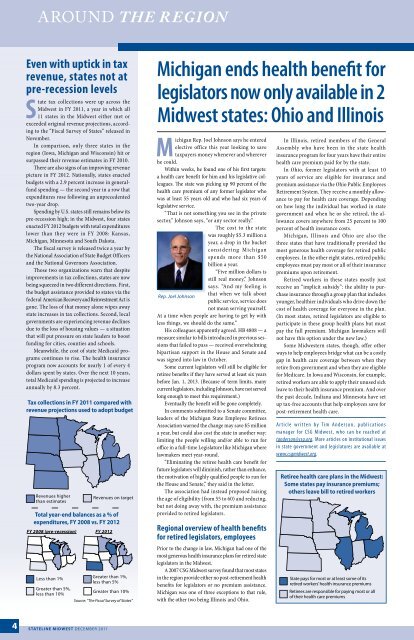Stateline Midwest - CSG Midwest
Stateline Midwest - CSG Midwest
Stateline Midwest - CSG Midwest
You also want an ePaper? Increase the reach of your titles
YUMPU automatically turns print PDFs into web optimized ePapers that Google loves.
Around The Region<br />
Even with uptick in tax<br />
revenue, states not at<br />
pre-recession levels<br />
State tax collections were up across the<br />
<strong>Midwest</strong> in FY 2011, a year in which all<br />
11 states in the <strong>Midwest</strong> either met or<br />
exceeded original revenue projections, according<br />
to the “Fiscal Survey of States” released in<br />
November.<br />
In comparison, only three states in the<br />
region (Iowa, Michigan and Wisconsin) hit or<br />
surpassed their revenue estimates in FY 2010.<br />
There are also signs of an improving revenue<br />
picture in FY 2012. Nationally, states enacted<br />
budgets with a 2.9 percent increase in generalfund<br />
spending — the second year in a row that<br />
expenditures rose following an unprecedented<br />
two-year drop.<br />
Spending by U.S. states still remains below its<br />
pre-recession high; in the <strong>Midwest</strong>, four states<br />
enacted FY 2012 budgets with total expenditures<br />
lower than they were in FY 2008: Kansas,<br />
Michigan, Minnesota and South Dakota.<br />
The fiscal survey is released twice a year by<br />
the National Association of State Budget Officers<br />
and the National Governors Association.<br />
Those two organizations warn that despite<br />
improvements in tax collections, states are now<br />
being squeezed in two different directions. First,<br />
the budget assistance provided to states via the<br />
federal American Recovery and Reinvestment Act is<br />
gone. The loss of that money alone wipes away<br />
state increases in tax collections. Second, local<br />
governments are experiencing revenue declines<br />
due to the loss of housing values — a situation<br />
that will put pressure on state leaders to boost<br />
funding for cities, counties and schools.<br />
Meanwhile, the cost of state Medicaid programs<br />
continues to rise. The health insurance<br />
program now accounts for nearly 1 of every 4<br />
dollars spent by states. Over the next 10 years,<br />
total Medicaid spending is projected to increase<br />
annually by 8.3 percent.<br />
Tax collections in FY 2011 compared with<br />
revenue projections used to adopt budget<br />
Revenues higher<br />
than estimates<br />
Total year-end balances as a % of<br />
expenditures, FY 2008 vs. FY 2012<br />
FY 2008 (pre-recession) FY 2012<br />
Less than 1%<br />
Greater than 5%,<br />
less than 10%<br />
Revenues on target<br />
Greater than 1%,<br />
less than 5%<br />
Greater than 10%<br />
Source: “The Fiscal Survey of States”<br />
Michigan ends health benefit for<br />
legislators now only available in 2<br />
<strong>Midwest</strong> states: Ohio and Illinois<br />
Michigan Rep. Joel Johnson says he entered<br />
elective office this year looking to save<br />
taxpayers money whenever and wherever<br />
he could.<br />
Within weeks, he found one of his first targets:<br />
a health care benefit for him and his legislative colleagues.<br />
The state was picking up 90 percent of the<br />
health care premium of any former legislator who<br />
was at least 55 years old and who had six years of<br />
legislative service.<br />
“That is not something you see in the private<br />
sector,” Johnson says, “or any sector really.”<br />
The cost to the state<br />
was roughly $5.3 million a<br />
year, a drop in the bucket<br />
considering Michigan<br />
spends more than $50<br />
billion a year.<br />
“Five million dollars is<br />
still real money,” Johnson<br />
says. “And my feeling is<br />
that when we talk about<br />
Rep. Joel Johnson<br />
public service, service does<br />
not mean serving yourself.<br />
At a time when people are having to get by with<br />
less things, we should do the same.”<br />
His colleagues apparently agreed. HB 4808 — a<br />
measure similar to bills introduced in previous sessions<br />
that failed to pass — received overwhelming<br />
bipartisan support in the House and Senate and<br />
was signed into law in October.<br />
Some current legislators will still be eligible for<br />
retiree benefits if they have served at least six years<br />
before Jan. 1, 2013. (Because of term limits, many<br />
current legislators, including Johnson, have not served<br />
long enough to meet this requirement.)<br />
Eventually the benefit will be gone completely.<br />
In comments submitted to a Senate committee,<br />
leaders of the Michigan State Employee Retirees<br />
Association warned the change may save $5 million<br />
a year, but could also cost the state in another way:<br />
limiting the people willing and/or able to run for<br />
office in a full-time Legislature like Michigan where<br />
lawmakers meet year-round.<br />
“Eliminating the retiree health care benefit for<br />
future legislators will diminish, rather than enhance,<br />
the motivation of highly qualified people to run for<br />
the House and Senate,” they said in the letter.<br />
The association had instead proposed raising<br />
the age of eligibility (from 55 to 60) and reducing,<br />
but not doing away with, the premium assistance<br />
provided to retired legislators.<br />
Regional overview of health benefits<br />
for retired legislators, employees<br />
Prior to the change in law, Michigan had one of the<br />
most generous health insurance plans for retired state<br />
legislators in the <strong>Midwest</strong>.<br />
A 2007 <strong>CSG</strong> <strong>Midwest</strong> survey found that most states<br />
in the region provide either no post-retirement health<br />
benefits for legislators or no premium assistance.<br />
Michigan was one of three exceptions to that rule,<br />
with the other two being Illinois and Ohio.<br />
In Illinois, retired members of the General<br />
Assembly who have been in the state health<br />
insurance program for four years have their entire<br />
health care premium paid for by the state.<br />
In Ohio, former legislators with at least 10<br />
years of service are eligible for insurance and<br />
premium assistance via the Ohio Public Employees<br />
Retirement System. They receive a monthly allowance<br />
to pay for health care coverage. Depending<br />
on how long the individual has worked in state<br />
government and when he or she retired, the allowance<br />
covers anywhere from 25 percent to 100<br />
percent of health insurance costs.<br />
Michigan, Illinois and Ohio are also the<br />
three states that have traditionally provided the<br />
most generous health coverage for retired public<br />
employees. In the other eight states, retired public<br />
employees must pay most or all of their insurance<br />
premiums upon retirement.<br />
Retired workers in these states mostly just<br />
receive an “implicit subsidy”: the ability to purchase<br />
insurance through a group plan that includes<br />
younger, healthier individuals who drive down the<br />
cost of health coverage for everyone in the plan.<br />
(In most states, retired legislators are eligible to<br />
participate in these group health plans but must<br />
pay the full premium. Michigan lawmakers will<br />
not have this option under the new law.)<br />
Some <strong>Midwest</strong>ern states, though, offer other<br />
ways to help employees bridge what can be a costly<br />
gap in health care coverage between when they<br />
retire from government and when they are eligible<br />
for Medicare. In Iowa and Wisconsin, for example,<br />
retired workers are able to apply their unused sick<br />
leave to their health insurance premium. And over<br />
the past decade, Indiana and Minnesota have set<br />
up tax-free accounts that help employees save for<br />
post-retirement health care.<br />
Article written by Tim Anderson, publications<br />
manager for <strong>CSG</strong> <strong>Midwest</strong>, who can be reached at<br />
tanderson@csg.org. More articles on institutional issues<br />
in state government and legislatures are available at<br />
www.csgmidwest.org.<br />
Retiree health care plans in the <strong>Midwest</strong>:<br />
Some states pay insurance premiums;<br />
others leave bill to retired workers<br />
State pays for most or at least some of its<br />
retired workers’ health insurance premiums<br />
Retirees are responsible for paying most or all<br />
of their health care premiums<br />
4<br />
STATELINE MIDWEST December 2011








